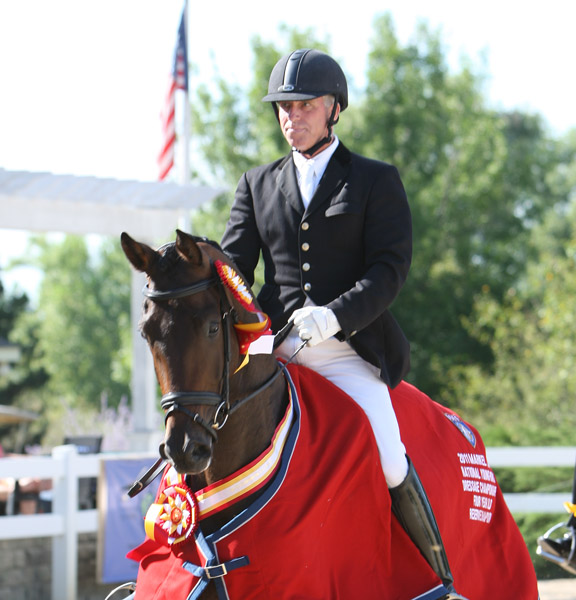Fundamental Change in Role of US Dressage Coach to be Proposed
12 years ago StraightArrow Comments Off on Fundamental Change in Role of US Dressage Coach to be Proposed

By KENNETH J. BRADDICK
A fundamental change in the role of the United States dressage coach to support riders and their own trainers rather than being the hands-on coach will be sought as a result of American team riders and the U.S. Equestrian Federation Dressage High Performance Committee meeting in Houston, Texas, this week to plot the future direction of the Olympic sport.
The role of the coach, officially called the Technical Advisor, has become a central issue since the London Olympics this summer, the second straight Games in which the United States failed to medal in dressage following four straight team bronze medal performances at the premier sporting event held once every four years.
However, sources reported from the two-day meeting, there was strong support for the national coach to be based in the United States–not necessarily a citizen, but an individual either resident or willing to move to America if selected for the position.
Residency was an issue in the selection process that led to Anne Gribbons becoming the coach three years ago following eight years during which German multiple Olympic gold medalist Klaus Balkenhol was the Technical Advisor but remained anchored in his homeland. Anne resigned after acrimonious fault finding over the U.S. London performance. Criticism was leveled against frequent intensive coaching sessions by Anne who took the unusual step of enlisting Steffen Peters, the nation’s top rider, as a coach although he was a member of the U.S. Olympic team.
The proposed new job description for the U.S. coach is in line with the evolution in many top dressage nations–including Germany and the Netherlands–where the national coach coordinates prospective team members along with their trainers, offers advice and typically becomes involved in actual coaching only when asked.
Closer collaboration between the USEF and the U.S. Dressage Federation in developing a pipeline of talent from ponies through International Equestrian Federation (FEI) levels was another issue that, sources said, was discussed at the closed-door summit. The USEF and the USDF headquarters are neighbors in the Kentucky Horse Park in Lexington.
The USDF, representative of a unique system in the world where independent member groups are affiliated and not part of the national federation, has taken bold steps in recent years to reshape the organization.
George Williams, president of the USDF and chairman of the USEF Dressage High Peformance Committee, has steered the USDF into expanding the widely popular annual regional championships to a national championships in 2013 among other significant changes to a group that had been known for years as centered on amateurs and national level riders.
No one has yet discussed publicly the USDF national championships replacing the USEF Festival of Champions that determines national titles for pony riders, junior, young rider, “Brentina Cup” developing combination, Intermediaire and Grand Prix as well as being the selection trials for world championships at Grand Prix and at small tour for the Pan American Games.
However, an effort to find a West Coast host for the 2013 festival failed to produce a bid after several years at the U.S. Equestrian Team Foundation headquarters in Gladstone, New Jersey. The festival was eventually awarded to Kentucky to be held in 2013 at the Horse Park that was the venue of the 2010 World Equestrian Games.
The difficulty of finding a host for the festival and ambitious plans for the USDF national championship has raised questions about the roles of the USEF with a relatively tiny staff and the USDF with a large staff funded by a membership base in a single sport.
Further, the Houston meeting heard praise for the ongoing development of rider tests by the USDF and the USEF on the ladder of progression through the levels.
George will no longer be chairman of the High Performance Committee after serving two four-year terms as chairman. A new committee will be appointed by the USEF president after voting, currently underway, for the Eligible Athlete Committee.
The proposed change in the role of the national coach will be reviewed by the USEF to insure it meets the requirements of the U.S. Olympic Committee that primarily funds the post.
If approved, it likely will go back to the new dressage High Performance Committee. The USEF will appoint new committee members–including three athlete representatives–to replace those whose terms expire. That is expected to occur during the USEF annual meeting in January.
Then, the USEF is expected to appoint a search committee in a process that most insiders expect to be similar to the selection of new Technical Advisors for eventing and jumping.
The dressage selection procedures three years ago were criticized for behind-the-scenes changes midway through the process.
They did, however, lead to creation of a selection format for technical advisors for jumping and eventing that won plaudits for openness. Search committees in both disciplines were headed by Eric L. Straus, an experienced business executive and active for many years in most aspects of horse sports. He organized public meetings with candidates across the country to hear their pitches and to field questions.
The selection of a new dressage Technical Advisor is expected to take four to six months.
There are, however, no senior championships in which a United States team will take part in 2013, unlike Europe which holds its continental championships once every two years. The next world contest–except for the annual World Cup for individuals–is the World Equestrian Games in Normandy, France in 2014.

